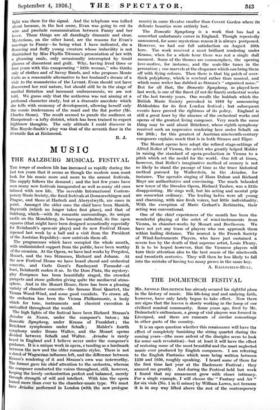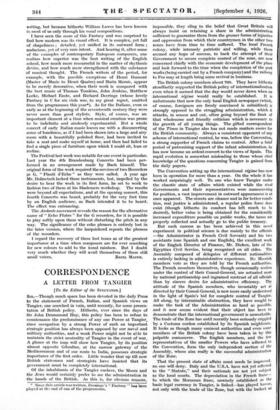THE DOLMETSCH FESTIVAL
MR. ARNOLD Dotstrrscu has already secured his rightful place in the history of music. His life-long zeal and undying faith, however, have only lately begun to take effect. Now there are signs that the leaven is slowly working in the lump of our civilized musical community. Some years ago, fired by Mr. Dolmetsch's enthusiasm, a group of viol players was formed in Liverpool, and there are rumours of similar consortings in other parts of the country.
It is an open question whether this renaissance will have the effect of completely banishing the string quartet during the coming years—(the more ardent of the disciples seem to look for some such revolution)—but at least it will have the effect of restoring some of the most beautiful and the mast neglected music ever produced by English composers. I am referring to the English Fantasies which were being written between 1550 and 1650, roughly speaking: I heard some of them for the first time last year at the Haslemere Festival ; they amazed me greatly. And during the Festival held last week I found that my amazement grew with closer intimacy. For a single example, I will choose the • " Fantasy and Air" for six viols (No. 1 in G minor) by William Lawes, nut because it is in any way lifted above the rest of the contemporary
writing, but because hitherto William Lawes has been known to most of us only through his vocal compositions.
I have seen the score of this Fantasy and was surprised to find how modem was its visual effect. It is complex, yet full of shapeliness ; detailed, yet unified in its outward form ; audacious, yet of very sure intent. And hearing it, after some of the examples of contemporary European composers, one realizes how superior was the best writing of the English school, how much more resourceful in the matter of rhythmic device, and how much more strengthened with the substance of musical thought. The French writers of the period, for example, with the possible exceptions of Henri Dumont (Master of Music to Henri Quatre) and Mann Marais, appear to be merely decorative, when their work is compared with the best music of Thomas Tomkins, John Jenkins, Matthew Locke, Michael Easte, and Richard Deeringe (whose lovely Fantasy in C for six viols was, to my great regret, omitted from the programmes this years). As for the Italians, even so early as at the beginning of the seventeenth century they were never more than good stylists. Style, of course, was an important element at a time when musical creation was prone to be indefinite and aimlessly experimental. But a whole concert of early Italian music leaves me with a disconcerting sense of loneliness, as if I had been shown into a large and airy room with a beautifully polished floor, had been invited to take a seat and make myself at home, and then had failed to find a single piece of furniture upon which I could sit, lean or recline.
The Festival last week was notable for one event in particular. Last year the 4th Brandenburg Concerto had been per- formed in an arrangement made by Bach himself. The original form of the work required the services of two Recorders in G, " Flauti d'Echo " as they were called. A year ago Mr. Dolmetsch lacked these instruments, but, impelled by the desire to hear the work in its first form, he set to work to fashion two of them at his Haslemere workshop. The results were beyond all expectations, and at the opening concert, this fourth Concerto was heard, probably for the very first time by an English audience, as Bach intended it to be heard. The effect was entrancing.
The Andante movement reveals the reason for the alternative name of "Echo Flutes" for the G recorders, for it is possible to play softly upon them without disturbing the pitch in any way. The significance of the echo phrases is entirely lost in the later version, where the harpsichord repeats the phrases of the recorders.
I regard the recovery of these lost tones as of the greatest importance at a time when composers are for ever searching for new colours to add to the tonal rainbow. But I doubt very much whether they will avail themselves of these still



































 Previous page
Previous page